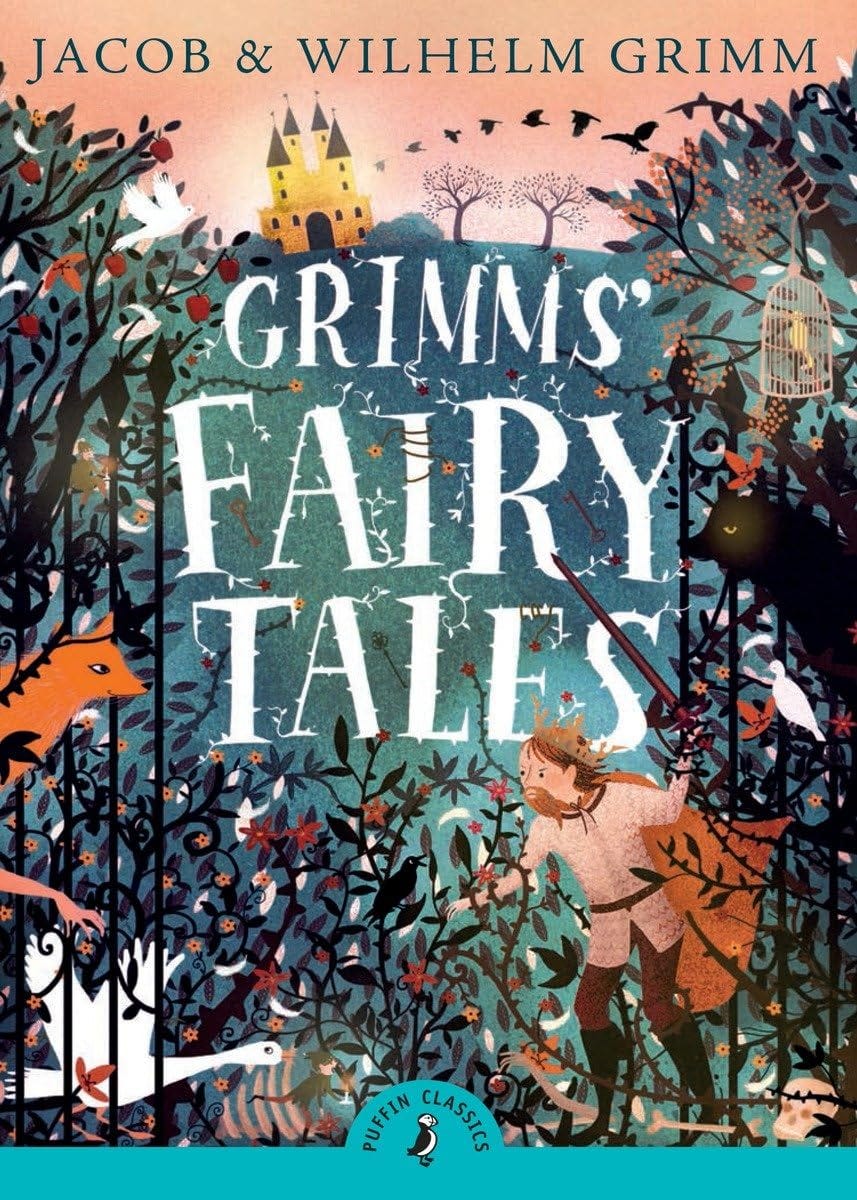
“Lucas, that’s just a story.” Parents still commonly use gentle corrections like this to address untruths, though approaches vary widely. Some parents prefer phrases like “That’s not quite what happened” or “Let’s stick to the facts.”
Meanwhile, we tell stories to children, sometimes every night. The best have a moral: “The Three Little Pigs” shows that taking time to do things correctly and carefully, like building a sturdy house, is better than quick, careless work. “The Boy Who Cried Wolf”—the importance of honesty and how lying can lead to people not believing you when you’re telling the truth.
Grimm’s fairy tales were meant to teach children life lessons, not frighten them. Because of parental concern, they were softened over time. In the original version of “Cinderella,” the stepsisters cut off parts of their feet to fit the glass slipper, and birds peck out their eyes at the wedding—authenticity prevails; the consequences of deception are severe. Modern versions omit the graphic details. Truth is now supposed to be happier. While Shel Silverstein’s “Where the Sidewalk Ends” is ostensibly about using your imagination and seeing the world differently, it could easily be #8 in the classic Seven Habits of Highly Successful People.
It isn’t easy to think of a good story that doesn’t have a good moral. The famous essayist Joan Didion says as much in remarking, “We tell ourselves stories to live.” We become the stories we are told and tell.
Didion’s true meaning is almost the opposite of an uplifting quote about the power of storytelling. For her, “storytelling is the problem.” Didion is quite dark and skeptical. In context, she is writing about her struggle to make sense of the chaotic events of the late 1960s—the Manson murders, the Black Panthers, and general social upheaval. Humans desperately try to impose narrative order on random events and find a moral in every story. “We look for the sermon in the suicide, for the social or moral lesson in the murder. We interpret what we see and select the most workable of the multiple choices.” Our need to create coherent narratives can blind us to a world that resists explanation. Didion thinks of the whole gamut: art and literature, books, stories, politics and public life.
Nietzsche said, “When you don’t understand somebody, don’t ask what they mean; look for what they want.” His insight parallels Didion’s skepticism about our obsession with constructing meaning. This search for definitive interpretation brings to mind another figure Nietzsche thought a lot about: Jesus, whom the philosopher usually respected (saving his wrath for St. Paul). The disciples frequently asked Jesus what he meant with his parables. What’s the point? Jesus said that’s the point: he is purposely obscure so that those who don’t know don’t get it: they may “see but not perceive, hear but not understand”—a method that seems to separate believers from non-believers. Divine judo?
Jesus provoked, didn’t prescribe. He posed riddles, not answers. “Who is your neighbor?” he’d ask, leaving you to grapple with the shame of a Samaritan savior. He commanded love, not obedience, offering a path, not a formula, urging action over pious words. He was the Way, not the Solution, demanding you think, then live. “Not everyone who says, ‘Lord, Lord,’ will enter the kingdom of heaven, but those who do the will of my Father.”
Behind every moral lies a story. In our time, what truly threatens democracy isn’t Donald Trump but fanatical certainty—his own, sometimes ours, not just that of his supporters. We turn to doubt’s inverse comfort: “It’s darkest before the dawn,” “Everything happens for a reason.” “God never gives us more than we can handle.” “They’ve got to hurt first before they’re much better off” (Elon Musk). “This too shall pass.”
We want encouraging stories where problems are viewed in a positive light. I was let down by the conclusion of Ernest Hemingway’s remarkable novel, The Sun Also Rises. The ending is particularly poignant because it captures the novel’s themes of post-war disillusionment and impossible love. The protagonist Jake Barnes’s closing response is irony—his war wound had made a physical relationship with Brett impossible. The final lines are a conversation between Jake and his would-be lover:
“Oh Jake,” Brett said, “We could have had such a damned good time together.”
Ahead was a mounted policeman in khaki directing traffic. He raised his baton. The car slowed suddenly, pressing Brett against me.
“Yes,” I said. “Isn’t it pretty to think so?”
The futility of dwelling on what might have been is haunting. Isn’t there more to be said? Is that the conclusion? Parts of the story were so beautiful.
Like the best stories, faith is truer when least expected. So, Hemingway aside, sometimes what’s right ends. . . happily.
Notes and reading
Joan Didion – The White Album (1979), 11-12.
“When you don’t understand somebody…” [Abridged]. While Nietzsche does not use this exact phrasing, in On the Genealogy of Morals and Beyond Good and Evil, he emphasizes interpreting human actions by uncovering hidden power dynamics rather than relying solely on explicit meanings or intentions.
Jesus – “see but not perceive. . .” Matthew 13:14, cf. Isaiah 6:9; Good Samaritan, Luke 10:25-37.
Ernest Hemingway – “Grace under pressure” in For Whom the Bell Tolls; Jake and Brett, The Sun Also Rises, last sentences.
Also,
Five foundational stories that have shaped American history and infuse present discord. – A Great Disorder: National Myth and the Battle for America by Richard Slotkin (National Book Award). Slotkin is a cultural critic and historian. He is the Olin Professor of English and American Studies Emeritus at Wesleyan University (Connecticut).
“Why children’s books?” – From a different angle, another look at stories. – Katherine Rundell, London Review of Books (February 2025). Of course, fantasy is escapist. “If we’re partisans of liberty, then it’s our plain duty to escape, and to take as many with us as we can.” (Tolkien) Rundell is the author of Impossible Creatures, named Waterstones Book of the Year for 2023.
#184 – A Democratic Miracle
#183 – A Passion for Democracy
About 2 + 2 = 5




